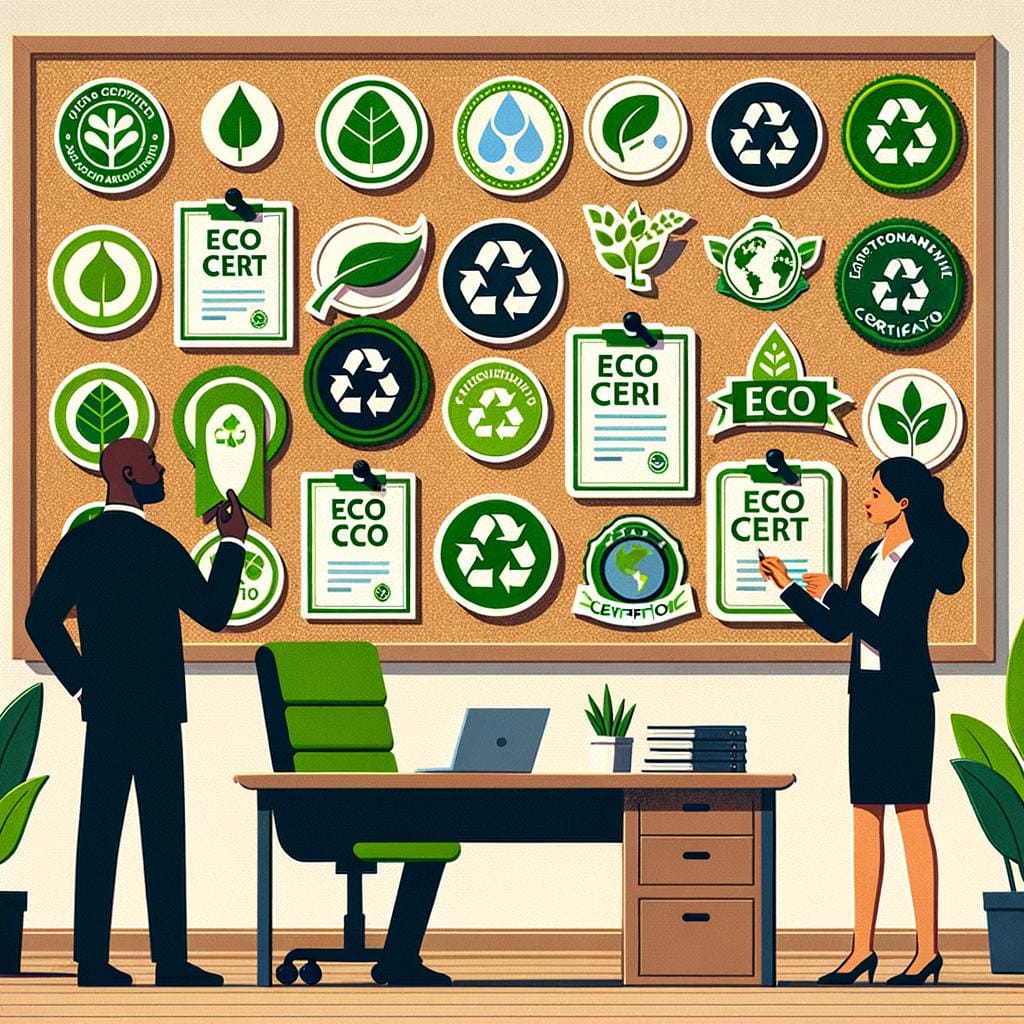Eco certifications play a crucial role in today’s consumer-driven market, where sustainability and ethical practices are at the forefront of decision-making. These certifications serve as a stamp of approval, indicating that businesses are meeting specific environmental standards and ethical criteria. Understanding the significance of eco certifications is key to navigating the complex landscape of sustainable practices and making informed choices as both consumers and businesses.
From Fair Trade to USDA Organic and LEED, there are various types of eco certifications available that cater to different industries and sectors. Each certification has its own set of criteria and standards that companies must meet to be considered environmentally responsible. Exploring these certifications can shed light on the diverse ways in which businesses can contribute to environmental protection, ethical sourcing, and building consumer trust through transparent practices.
Obtaining eco certifications requires a commitment to transparency, compliance with stringent requirements, and adherence to sustainable practices. This step-by-step process can often be challenging for companies seeking certification but comes with numerous benefits such as enhancing brand reputation, attracting environmentally-conscious consumers, and staying competitive in a market increasingly focused on sustainability.
In the following sections, we will delve into the different types of eco certifications, their advantages, how to obtain them, real-life case studies, challenges faced by businesses, and the future trends in sustainable certifications.
Types of Eco Certifications
Eco certifications play a crucial role in ensuring that businesses and products adhere to sustainable practices. There are various types of certifications available in the market, each focusing on different aspects of environmental protection, ethical sourcing, and overall sustainability. Here are some popular eco certifications that have gained recognition and trust from consumers:
- Fair Trade Certification: This certification ensures that the producers of goods receive fair compensation for their labor and follow ethical practices in their production processes.
- USDA Organic Certification: Products bearing this label comply with strict guidelines set by the United States Department of Agriculture regarding organic farming methods and the non-use of synthetic chemicals.
- LEED Certification: The Leadership in Energy and Environmental Design (LEED) certification is specific to buildings and focuses on energy efficiency, water conservation, and overall sustainability in construction.
These eco certifications not only benefit the environment but also contribute to consumer trust by providing transparency about a company’s commitment to sustainable practices. By obtaining these certifications, businesses can distinguish themselves as leaders in corporate social responsibility.
In today’s market, consumers are increasingly mindful of the impact their purchases have on the environment. Therefore, having eco certifications can give businesses a competitive edge by attracting environmentally-conscious customers. Moreover, these certifications can open doors to new markets and partnerships with like-minded organizations that value sustainability. Overall, eco certifications are essential tools for businesses looking to showcase their dedication to preserving our planet for future generations.
Benefits of Eco Certifications
Eco certifications play a significant role in promoting sustainable practices across various industries. These certifications serve as a way for businesses to demonstrate their commitment to environmental protection, ethical sourcing, and consumer trust. By obtaining eco certifications, companies not only showcase their dedication to sustainability but also differentiate themselves from competitors in the market.
Environmental Protection
One of the key benefits of eco certifications is the positive impact they have on the environment. Companies that hold certifications such as LEED (Leadership in Energy and Environmental Design) or USDA Organic are required to adhere to strict standards that minimize their carbon footprint, reduce waste generation, and promote resource efficiency. Through these practices, businesses contribute to mitigating climate change, conserving natural resources, and preserving biodiversity.
Ethical Sourcing
Another important aspect of eco certifications is their emphasis on ethical sourcing practices. Certifications like Fair Trade ensure that products are sourced in a socially responsible manner, with fair wages paid to workers and safe working conditions maintained. By choosing certified products, consumers can support sustainable supply chains and help empower producers in developing countries. This focus on ethical sourcing not only benefits workers and communities but also aligns with consumer preferences for ethically produced goods.
Consumer Trust
Eco certifications also play a crucial role in building consumer trust and loyalty. In today’s competitive marketplace, consumers are becoming increasingly conscious of the environmental and social impact of their purchasing decisions. By displaying eco certifications on their products or services, companies signal transparency and accountability to consumers who prioritize sustainability.
This transparency builds trust with customers who value environmentally friendly options and want to support businesses that share their values. Ultimately, eco certifications help businesses attract environmentally conscious consumers and foster long-term relationships based on shared sustainability goals.
How to Obtain Eco Certifications
Obtaining eco certifications can be a significant step for businesses looking to showcase their commitment to sustainable practices. The process typically involves meeting specific criteria set by certifying bodies that focus on environmental impact, ethical sourcing, and other sustainability factors. One key aspect of obtaining eco certifications is conducting an internal audit to assess the current practices and identify areas that need improvement to align with certification requirements.
To start the certification process, businesses need to research and select the appropriate eco certification that best fits their industry and sustainability goals. For example, if a company is in the food industry, they may opt for USDA Organic certification, while a construction firm may choose LEED (Leadership in Energy and Environmental Design) certification. Understanding the nuances of each type of certification is crucial in making an informed decision.
Once the appropriate eco certification is selected, businesses should thoroughly review the requirements and documentation needed for the application process. This often includes providing detailed information about operations, supply chains, product ingredients or materials used, waste management practices, and more.
In some cases, companies may need to make operational changes or investments in order to comply with eco certification standards. Undertaking this process not only demonstrates a commitment to sustainability but also opens up opportunities for reaching environmentally conscious consumers who prioritize products with eco credentials.
| Key Steps | Description |
|---|---|
| Research Eco Certifications | Identify which certification aligns with your business and sustainability goals. |
| Review Requirements | Thoroughly understand what documentation and operational changes are needed for the application process. |
| Complete Application | Gather all necessary information and submit the application according to guidelines provided by the certifying body. |
Case Studies
When it comes to eco certifications, many businesses and products have successfully obtained various certifications to showcase their commitment to sustainability. These certifications not only benefit the environment but also help in building trust with consumers who are increasingly looking for ethical and sustainable options. Here are some real-life examples of businesses and products that have embraced eco certifications:
- Patagonia: The outdoor clothing company Patagonia is a prime example of a business that has prioritized sustainability through eco certifications. They have obtained certifications such as Fair Trade Certified and bluesign® which assure customers that their products are made with environmentally friendly practices and fair labor conditions.
- Starbucks: As a global coffee chain, Starbucks has been proactive in obtaining eco certifications for their coffee sourcing. They have certifications like USDA Organic and C.A.F.E. Practices (Coffee and Farmer Equity) which ensure that their coffee beans are ethically sourced and produced sustainably.
These case studies highlight how businesses across various industries can proactively seek out eco certifications to demonstrate their commitment to environmental protection and ethical practices. By investing in these certifications, companies not only contribute to a greener future but also appeal to a growing market of conscious consumers looking to support sustainable brands.
- Ecover: A leading brand in ecological cleaning products, Ecover is known for its dedication to sustainable practices. They hold eco-friendly certifications such as EU Ecolabel and Leaping Bunny (Cruelty-Free International) which assure customers that their products are safe for the environment and cruelty-free.
- Tesla: The electric vehicle manufacturer Tesla prides itself on being at the forefront of green technology. Tesla’s cars are manufactured in facilities with LEED (Leadership in Energy and Environmental Design) certification, showcasing their commitment to energy efficiency and reducing carbon footprint.
These examples demonstrate the diverse range of industries where eco certifications play a crucial role in promoting sustainable practices. By following these successful cases, other businesses can learn how certifying their products or operations can not only benefit the planet but also establish themselves as leaders in environmental stewardship within their respective sectors.
Challenges of Eco Certifications
Lack of Awareness and Education
One of the main challenges that companies face in obtaining eco certifications is the lack of awareness and education surrounding these certifications. Many businesses may not fully understand the benefits of becoming certified or how to navigate the certification process.
This can result in confusion, delays, or even reluctance to engage in sustainable practices due to misconceptions. To overcome this obstacle, companies need to invest in educating themselves and their employees about the importance of eco certifications, as well as seek guidance from experts in the field.
Cost and Resources
Another significant challenge for companies pursuing eco certifications is the cost associated with implementing sustainable practices and undergoing certification processes. Depending on the type of certification sought, companies may need to invest in new technologies, conduct audits, or hire consultants to ensure compliance with certification requirements.
For smaller businesses operating on tight budgets, this financial burden can pose a major hurdle. Additionally, maintaining certifications over time requires ongoing resources and commitment, which some companies may struggle to sustain in the long run.
Complexity of Requirements
The complexity of certification requirements can also present a challenge for companies seeking eco certifications. Different certifications have varying criteria and standards that must be met, which can be overwhelming for organizations navigating multiple certification frameworks simultaneously.
Understanding and keeping up-to-date with these requirements demand significant time and effort, especially for larger corporations with complex supply chains. Companies must carefully assess which certifications align best with their values and operational practices while also ensuring they have the capacity to meet all necessary criteria before pursuing certification.
The Future of Eco Certifications
As the global focus on sustainability grows, the future of eco certifications is poised for significant trends and innovations in the industry. One key trend that is emerging is the integration of blockchain technology to enhance transparency and traceability in supply chains. By utilizing blockchain, eco certifications can provide consumers with real-time information about the origins of products, ensuring ethical sourcing practices. This level of transparency not only builds trust but also holds businesses accountable for their sustainability claims.
Another notable trend shaping the future of eco certifications is the emphasis on circular economy principles. Certifications are increasingly focusing on how companies manage resources throughout their entire lifecycle, from production to disposal or recycling. By promoting circularity, eco certifications encourage businesses to minimize waste, reduce environmental impact, and maximize resource efficiency. This trend aligns with broader efforts to create a more sustainable economy that values long-term environmental stewardship.
Innovative technologies such as remote sensing and artificial intelligence are also expected to play a crucial role in enhancing eco certifications. These tools can help assess environmental performance, monitor compliance with sustainability standards, and provide insights for continuous improvement.
As advancements in technology continue to evolve, eco certifications will likely leverage these tools to streamline processes, increase accuracy in assessments, and adapt to emerging sustainability challenges. The future of eco certifications is bright with possibilities for driving positive change towards a more sustainable future.
| Trend | Impact |
|---|---|
| Blockchain Technology | Enhanced transparency and traceability in supply chains |
| Circular Economy Principles | Promotes waste reduction and resource efficiency throughout product lifecycles |
| Innovative Technologies | Improves assessment accuracy and monitoring compliance with sustainability standards |
Conclusion
In conclusion, eco certifications play a crucial role in promoting sustainable practices and responsible consumption across various industries. By obtaining certifications such as Fair Trade, USDA Organic, or LEED, businesses can showcase their commitment to environmental protection, ethical sourcing, and transparency to consumers. These certifications not only validate companies’ green claims but also build trust with environmentally conscious customers.
Furthermore, the process of obtaining eco certifications may pose challenges for businesses, such as meeting specific criteria or navigating the certification process. However, the benefits of achieving these certifications far outweigh the obstacles faced. Not only do eco certifications help companies differentiate themselves in a competitive market, but they also demonstrate a dedication to corporate social responsibility and sustainability.
Looking ahead, the future of eco certifications remains promising as more businesses recognize the importance of integrating sustainability into their operations. With emerging trends and innovations in sustainable certifications in various industries, we can expect to see a continued shift towards more environmentally friendly and socially responsible practices. Ultimately, eco certifications are shaping the future of sustainable practices by influencing consumer behavior, driving industry standards, and fostering a more sustainable global economy.
Frequently Asked Questions
What Is Eco Certified?
Eco Certified is a certification that signifies a product or service has met certain environmentally-friendly criteria. This certification is typically given to businesses that demonstrate sustainable practices in their operations, such as reducing waste, conserving energy, and using eco-friendly materials.
What Is the Best Certificate for Sustainability?
The best certificate for sustainability would be one that is recognized globally and has strict standards in place to ensure products or services meet certain environmental and social responsibility criteria. Certifications like the LEED (Leadership in Energy and Environmental Design) or B Corp are highly regarded in the sustainability industry for their comprehensive assessment processes.
What Is an ESG Certification?
ESG certification stands for Environmental, Social, and Governance certification. This type of certification evaluates a company’s performance on key environmental, social, and governance factors.
It provides investors and stakeholders with valuable insight into how well a company is managing its impact on the planet and society, in addition to its overall governance structure. Companies with high ESG ratings are often seen as more sustainable and responsible investments.

An avid outdoor enthusiast, writer, and environmental advocate who has spent over two decades exploring the world’s most breathtaking landscapes. With a background in environmental science and a passion for adventure, Frances combines her love for nature with her talent for storytelling to inspire others to embark on their own outdoor journeys.




